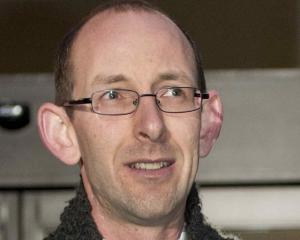Material from the confidential psychological report prepared before he took early retirement in 1999 was yesterday used against a key officer in the Bain murder investigation.
The credibility of former detective sergeant Milton Weir was repeatedly attacked by defence counsel Michael Reed QC during intensive cross-examination over two days in the High Court at Christchurch.
Mr Weir was the officer in charge of the overall scene at the Bain house in Every St after five members of the family were found shot dead inside the Dunedin property early on June 20, 1994.
The sole survivor, David Cullen Bain, now 37, is being retried for the murders on which he was convicted at his first trial in Dunedin in 1995. Bain denies murdering his parents, Robin and Margaret Bain, sisters Arawa and Laniet and schoolboy brother Stephen.
The focus of much of the cross-examination of officers involved in the original investigation has been to highlight perceived inadequacies in the way police handled the inquiry and, in the case of Mr Weir, to accuse him of misleading the jury at the first trial, of ignoring or concealing evidence that might point to Robin, not David Bain, as the killer and to paint him as unreliable and dishonest.
Mr Reed also directly accused Mr Weir of planting a spectacle lens found in Stephen Bain's bedroom where the 14-year-old's body lay on the floor.
During his evidence-in-chief on Monday, Mr Weir told Crown counsel Kieran Raftery that during the first trial, he had shown the jury a photograph and pointed to what he mistakenly believed was the spectacle lens. He had since realised he was wrong and that what he had identified to the jury was a "false lens", an optical illusion or specular effect which occurred in the photograph.
Mr Weir agreed he had misled the first jury but said it had not been deliberate.
Mr Reed pointed to a photograph of the area next to where the real lens was found under an ice skating boot and suggested a gap where a green wind jacket had been moved was "precisely where you would put your hand in if you were going to put the lens in there".
Mr Weir accepted it was "close" but Mr Reed then accused him of putting his hand in the gap and of placing the lens in the position where it was found, an allegation Mr Weir said he "categorically denied".
The lens was believed to have come from glasses worn by David Bain during the struggle with Stephen. To a suggestion it was "rather odd" the gap shown in the photograph was "right where the lens was found", Mr Weir said "I don't know if it's odd or not, but there is no way I put the lens there."
He was also asked about what Mr Reed described as a "stick-like" representation of the accused and the words "hang David Bain" which a next-door neighbour said had been painted on the wall of Mr Weir's Maori Hill home in 2002.
He agreed the words "hang Bain" had been spray-painted on a board on one wall of his house. But it was a wall marked for demolition and the words were there for only a day. It had been "inappropriate" to paint the words on the board, Mr Weir said. He thought it was his response to the stress he and his family had been under and followed a small social function after a Court of Appeal ruling which seemed to put an end to the Bain case.
Asked about a gift from a prostitute named Petra in 1997 during inquiries by another detective, Mr Weir said he remembered "this prostitute turned up at the police station with a pair of socks", which he instructed the other detective to make an exhibit. But he did not recall a private note to "Milton". He said he had thought the incident seemed "bizarre" at the time.
He did not know any prostitute named Petra, but had been familiar with visiting brothels in his formal capacity as an officer. Police had the task of monitoring such premises, even though they were at that time illegal.
Mr Weir was also asked by Mr Reed about an electronic notebook belonging to Laniet. Computer expert Martin Cox earlier told the hearing he had been asked to examine the notebook in 1994.
But Mr Weir said he had no knowledge of the electronic notebook, although he was aware Laniet worked as a prostitute under the name Page.
He was then asked about various allegations made against him after Joe Karam's book was published and his responses to the allegations and views he had expressed about what other officers felt about him, that he was not seen as trustworthy.
Mr Reed also asked if, in the years before he left the police, Mr Weir had believed he was being viewed with suspicion by his supervisors, was being made a scapegoat and that there was a perceived generalised lack of trust from his superiors.
Mr Weir said he had been "sick of the constant investigation", that he had been "sick of everything".





